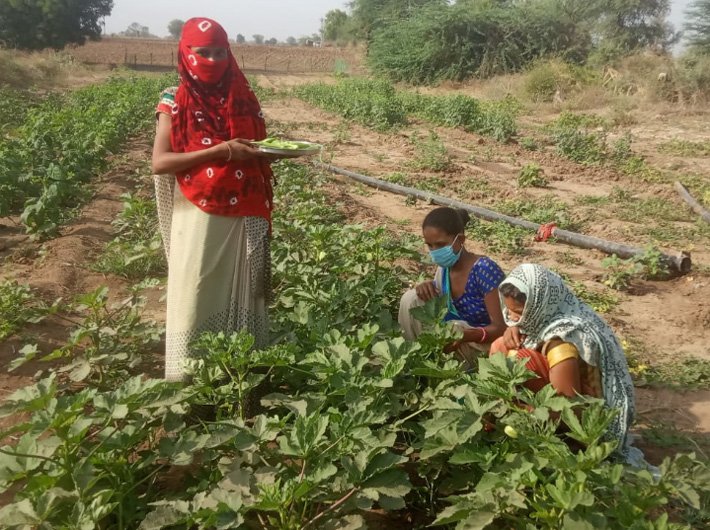Adani Foundation promotes ‘Poshan Vatika’ under nutrition project in Narmada district
When the whole world is fighting COVID-19, food and nutrition security has become a major issue. The pandemic has aggravated the existing food crisis in India, especially in rural and tribal regions. There has been less availability of fresh foods in most parts of the country, and the tribal community has been hit by poor diet and simply cannot access or afford fresh foods. However, the availability of fresh vegetables from the ‘Poshan Vatika’, set up two months ago, has turned out to be a savior for the tribal community in the remote areas of Narmada district of Gujarat.
The ‘Poshan Vatika’ or kitchen gardens have been promoted by Adani Foundation under its SuPoshan Project which was launched one and half year ago to strengthen the nutrition base of people and also to take forward the PM’s overreaching ‘Poshan Abhiyan’.
People involved in the project chose various local green leafy vegetable seeds like spinach, amaranth leaves and other vegetables like, long beans, cluster beans, ladies finger and drumsticks which are iron-rich and have adequate nutrition health benefits. Training has been provided to the beneficiaries about sowing seeds and using organic composite to achieve the positive results. Project SuPoshan focuses on interventions like kitchen garden activity with regard to child and women – SAM children Family, Pregnant women, lactating mothers and adolescent girls. SuPoshan Sangini encourages families to grow local vegetables in their kitchen backyard and also demonstrate healthy, innovative and nutritious recipes.
One of the major factors which impacts nutrition is the lack of availability but that have been overcome by the concept of kitchen garden during this lockdown. In the past 30 days, about 1,000 families of Narmada district received fresh vegetables without spending any money. Overall in Narmada, each family receives 1kg spinach leaves, 700 gm amaranth leaves, 300 gm ladies finger, 350 gm cluster beans and 500 gm long beans at one time and saved about Rs 275 each time. The families and beneficiaries are sharing selflessly despite the fact that most of them are marginal farmers or landless labourers, facing crunch in the current situation.
‘Suposhan Sangini’ Tulsiben Bhil supported Anitaben Sunilbhi Bhil, from Uchad gam in Tilakwada block of Narmada district, for developing Poshan Vatika in her kitchen backyard in February when Anitaben was in the second trimester of her pregnancy. As her husband’s daily wage income was hit by the lockdown, the family was worried as Anita was pregnant and adequate healthy food is needed during the pregnancy.
Once Anita, walking through her kitchen backyard, looked at spinach leaves which were growing well, and this made her smile. She picks up the leaves for using in her one time meal of the family. In a few days she also found other vegetable also growing well for use like and she started using the fresh vegetables from her own Poshan Vatika in regular meals.
“Poshan Vatika has helped my family during the lockdown when we won’t have a single vegetable available at our home otherwise. It was my fifth month of pregnancy, when consumption of fresh vegetable is most required, when our village ‘Sangini’, Tulsiben Bhil, counselled me,” says Anitaben.
Varshaben Ravindrabhai Vasava of Sabuti village in Dediapada block was encouraged by SuPoshan Sangini Vanaben Sureshbhai Vasava in February. Varshaben sowed the seeds of spinach, amaranth leaves, ladies finger and cluster beans. Her son, Shouryakumar, nearly three years old, was severely malnourished and during the lockdown the ‘Sangini’ counselled her for home-based management. As the daily wage income of family was hit by the lockdown, it was Poshan Vatika that helped the family to sustain.
Varshaben says, “Our village SuPoshan Sangini taught us healthy, nutritive recipes in Sneh Shivirs before the lockdown and today I am applying that, preparing healthy recipes at home and feeding my child.”
Savitriben Vasava, from of Devidav village in Sagbara block, says she was motivated by ‘Suposhan Sangini’ Manishaben Vasava to grow a kitchen garden in February. “Manishaben supported my family in sowing the seeds of vegetables as I was seven-month pregnant. When the lockdown was announced, our family was facing difficulty in buying vegetables because of the markets are far away from the village. However, the availability of vegetables from Poshan Vatika saved my family.
Ankita Sharma holds M.Sc. in Public Health and Nutrition, and has been working with Adani Foundation under Project Suposhan in Narmada district.
